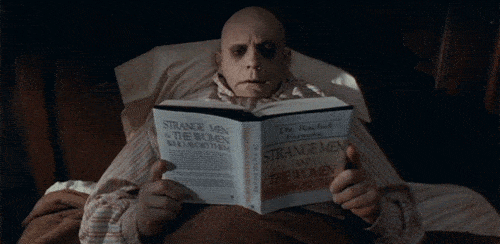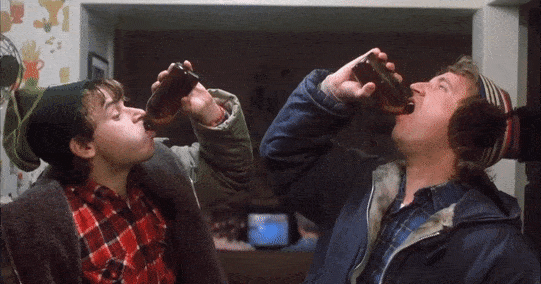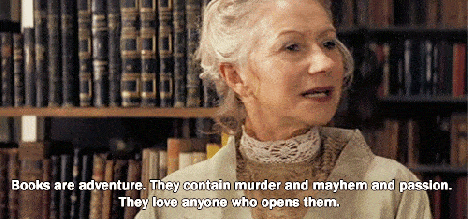From the many reworkings of Shakespeare to inspirations for Kubrick and Paul Thomas Anderson films.
When you love a book, there’s nothing more worrisome than seeing it get the big screen treatment. Hollywood has been pushing the “adapt famous books” gambit since the early days, with some of the first feature-length films taking stabs at everything from Dante to Dickens. But historical precedent doesn’t make it hurt any less when a studio misses the point of what made a book so good in the first place. Looking at you, The Hobbit.
Thankfully, while anticipating cinematic book-to-film adaptations is nerve-wracking, the reverse scenario is quite delightful: “Wait a minute, this film I love is based on a book?”

Knowing IS half the battle!
Whenever I find out that a movie I like has roots in a piece of well-known literature, I am overjoyed because it means I get to spend more time in that world. Or at the very least, in the head of the director as they plotted deviations, condensed plot points, and jotted down set pieces that could be showcased on screen. It’s like discovering an ancient city has been buried beneath you this whole time — you just didn’t know it. “Sorry, there’s a book version of AMC’s The Terror? It’s 784 pages long?” Hell yeah, baby, I’ll be in my reading nook.
Here are 10 movies, in no particular order, that (surprise!) are based on famous books:
Forbidden Planet (1956)

Based on: “The Tempest” by William Shakespeare
In addition to being one of the most influential pieces of science fiction ever made, Forbidden Planet also has the distinction of being a top-notch Shakespeare adaptation. Both “The Tempest” and Forbidden Planet see a ship arrive in a remote, unknown land presided over by a territorial, all-powerful hermit and his doe-eyed daughter. In the film, magic is exchanged for far-flung science, the unseen witch Sycorax is replaced by the planet’s long-dead alien stewards, and Caliban is swapped out for A.I. charm bomb Robby the Robot. Points of contact notwithstanding, “The Tempest” and Forbidden Planet are very different stories: the former being a revenge tale and the latter a murder mystery. Where they collide is in a shared message of humility at home in science fiction and Shakespeare alike; a charting of the world, and of man’s place in it.
![]()
Eyes Wide Shut (1999)

Based on: “Traumnovelle” by Arthur Schnitzler
No one adapts literature to the screen like Stanley Kubrick. Well, nobody really does anything like Stanley Kubrick. But throw a stone at the man’s filmography and you’re bound to hit a book-based cinematic masterpiece. Eyes Wide Shut is no exception, itself a loose adaptation of a serialized Austrian novella from 1926. “[‘Traumnovelle‘] explores the sexual ambivalence of a happy marriage and tries to equate the importance of sexual dreams and might-have-beens with reality,” Kubrick explained in an interview with French film critic Michel Ciment. “The book opposes the real adventures of a husband and the fantasy adventures of his wife, and asks the question: is there a serious difference between dreaming a sexual adventure, and actually having one?” Brb, booting up my Kindle.
![]()
Strange Brew (1983)

Based on: “Hamlet” by William Shakespeare
There have been a lot of cinematic adaptations of “Hamlet,” some more literal and more directed by Kenneth Branagh than others. But none of them are Strange Brew, which takes one of the greatest achievements of the English language and asks, “okay, what if it were about beer?” Reprising their SCTV characters Bob and Doug McKenzie, Dave Thomas and Rick Moranis embark on a noble quest to thwart the plans of the evil Brewmeister (Max von Sydow), who has taken over the Elsinore beer company after its previous owner died under mysterious circumstances. Snobs can take off, I like my Shakespeare dry-hopped.
![]()
28 Days Later (2002)

Based on: “The Day of the Triffids” by John Wyndham
28 Days Later is an unconventional zombie movie with an unconventional source of inspiration: a 1951 sci-fi novel about killer plants. “The Day of the Triffids,” also adapted into a film in 1963, kicks off with a mysterious green meteor shower blinding all with the misfortune to look upon it. Our hero, Bill Masen, is in the hospital after a workplace accident sustained while researching a mysterious man-eating plant species known as “triffids.” He wakes up, un-bandages his eyes, and wanders through the anarchic streets of London, horrified and confused. Sound familiar? Maybe like one of the most iconic sequences in cinema? The similarities don’t stop there, with the film borrowing much of its structure and thematic underpinnings from Wyndham’s novel. The flesh-hungry plants didn’t make the cut, but the implied polygamy cult sure did!
![]()
Bedazzled (1967 and 2002)

Based on: “Faust” by Johann Wolfgang Goethe
“Faust” is a centuries-old legend that asks a devilishly simple question: “what would it take for you to sell your soul to Satan?” For Goethe, what begins as a blank check from Beelzebub boils down to wanting to be loved by a certain, special someone. This is where Bedazzled, an extremely British comedy starring Peter Cook and Dudley Moore, gets its groove. The film sees a milquetoast romantic hellbent on winning the girl of his dreams, and Satan is only too happy to oblige… on one, infernal condition: when the wishes run out, so will our hero’s ownership of his soul. Magnum opus of German Romanticism or situational comedy of errors, the message is clear: be careful what you wish for.

Don’t worry, Brendan Fraser remake, I didn’t forget about you.
![]()
My Own Private Idaho (1991)

Based on: “Henry IV” parts I and II and “Henry V” by William Shakespeare
Leave it to Gus Van Sant to adapt not one but three Shakespeare plays into an indie coming-of-age drama about gay hustlers in Portland, Oregon. My Own Private Idaho sees Keanu Reeves’ privileged but rebellious Scott as a modern Prince Hal, River Phoenix as a looser vision of Poins, a bathrobe bedecked William Richert as a vagrant Falstaff, and the decrepit Sovereign Hotel in the place of the pub of Mistress Quickly. The Bard rears his head in occasionally explicit moments, most notably in an homage to the coronation scene from “Henry IV.” But after the first half hour, the source material is abandoned as swiftly as it was introduced. That said, even in his history plays, Shakespeare is nothing if not timeless, acting as a channel for modern messages of queer identities, found family, and the heartbreak of unattainable love.
![]()
The Killing of a Sacred Deer (2017)

Based on: “Iphigenia in Aulis” by Euripides
You know when you’re just minding your own business being a successful patriarch who may or may not have blood on his hands when suddenly supernatural forces threaten to ruin your entire life unless you murder one of your children? If yes, then you are probably one of two people: the Greek King Agamemnon or Colin Farrell in The Killing of a Sacred Deer. Where Euripides’ tragedy saw a man forced to sacrifice his daughter in exchange for winds to get him and his armies to Troy, Farrell must appease a sadistic teen with a very punchable face (sorry Barry Keoghan) by taking the life of one of his own children. That this sinister teen frames the sacrifice as payment for his own father’s death, which he (rightfully) blames on Farrell, is wholly appropriate. Mythologically, the events of “Iphigenia at Aulis” kick off a series of eye-for-an-eye inter-familial blood-debts that culminate in the establishment of Athenian democracy. So maybe all that murder was worth it, who’s to say.
![]()
The Iron Giant (1999)

Based on: “The Iron Man” by Ted Hughes
Published in 1968, British Poet Laureate Ted Hughes wrote “The Iron Man” to comfort his young children after the suicide of his wife, Sylvia Plath. Hughes’ novel tells of a young boy befriending a mysterious metal monster, who becomes an unlikely hero when it takes down a “Space-Bat-Angel-Dragon” drawn to Earth by human warmongering. Brad Bird’s The Iron Giant hits the same anti-violence pitch, subbing out an intergalactic space dragon for Dr. Strangelove levels of trigger-happy nuclear shenanigans. Fun fact: Hughes super approved of the film’s script, writing: “I want to tell you how much I like what Brad Bird has done…I can’t stop thinking about it.” Neither can we, Ted. Neither can we.
![]()
There Will Be Blood (2007)

Based on: “Oil!” by Upton Sinclair
Like HW to Daniel Plainview, There Will Be Blood is very much the adopted son of its source material,“Oil!.” The family resemblance is there, in the slow, grim sprawl of proud men trying to strike rich in the oil boom. And in the irruptive, fiery spectacle of an immolating oil rig (“the whole mass, boiling and bursting,” Upton Sinclair wrote). But, as Paul Thomas Anderson himself put it, the novel (and then, only a third of it) was more of a “really good collaborator,” than a mentor. Which is, all things being equal, probably the most HW Plainview way of putting it.
![]()
The Parent Trap (1961 and 1998)

Based on: “Lottie and Lisa” by Erich Kästner
Not only is Disney’s beloved Lindsay Lohan caper a remake, it’s an impressively faithful adaptation of Erich Kästner’s 1949 novel “Lottie and Lisa.” Kästner originally pitched the story to Nazi authorities as a film script called “The Great Secret.” But before he could move forward the Nazis revoked his right to work. Because if there’s one thing Nazi’s hate, it’s heartwarming comedies about adorable children helping their divorced parents fall in love again. Anyway, if you’re looking to stick it to fascists at your next viewing party, feel free to boot up some retro LiLo.
![]()
That’s all folks—the more you know!

The post 10 Movies Secretly Based on Famous Works of Literature appeared first on Film School Rejects.
0 comments:
Post a Comment